The first women who enrolled at Babson in the late 1960s and early 1970s may not have considered themselves pioneers, but they were. Entering what was for decades an all-male realm took courage, determination, and a drive to succeed. Sandra Adams ’70 and Anne McCormick Heller ’70 were the first women who received undergraduate degrees, and Ina Mae Harman ’70, who died in 1987, was the first African-American woman to earn an MBA.
Since then, Kerry Healey was named the first female president in 2013, and Marla Capozzi MBA’96 first female chair of the Board of Trustees in 2017. The Centennial undergraduate class of 2019 was the first to have a female majority. In September, women from the first decade of graduating classes will return to the College as the Pioneering Women of Babson, partnering with the Center for Women’s Entrepreneurial Leadership to support current and future students and alumnae and inspire engagement and donations.
We asked some of these women to share their memories of campus and to offer advice to women students today.
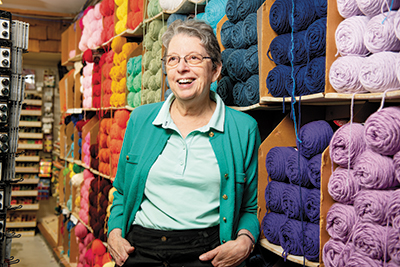
Carolyn Levosky MBA’69
Photo: Webb Chappell
Carolyn Levosky MBA’69
The first woman to earn a master’s degree
“These were changing times, but I still thought it was very brave of Babson to accept women. It was a bit experimental on their end, but I’m sure they saw the trends. The MBA students were a little older, and very welcoming, very open-minded.
“I was not trying to prove anything. When I graduated, they put my picture on the front page of The Boston Globe. It was a very big event. But I was just trying to do a good job for the next group of women, and I was glad to be early in the game. I think the writing was on the wall that women were going to go to graduate school and into the workforce in a big way.”
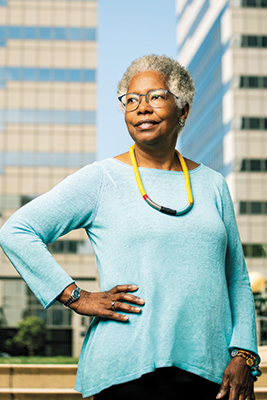
Sharon Rowser ’74
Photo: Winni Wintermeyer
Sharon Rowser ’74
“I was offered a full scholarship, and Babson showed a lot more interest in me than other schools I applied to. The civil rights movement was happening during that time, and colleges were reaching out to bring more minority students in, so I knew I was part of that. There was definitely a sense in those days that you were representing your people. A lot of single-sex schools were becoming coed then. What was more startling was how small the African-American population was. I was the only African-American woman in the school my first year. It’s complicated, and a bit emotional, too; it made me feel pretty alone, even though in high school it wasn’t unusual for me to be in classes with few African-Americans. Freshman year was the hardest, and it was definitely the living and social parts that made it hard. I felt I was as smart as everyone else, and I wasn’t afraid to show that. I was part of the Black Students Union, and we worked as a group to recruit more students of color in my first two years at Babson.”
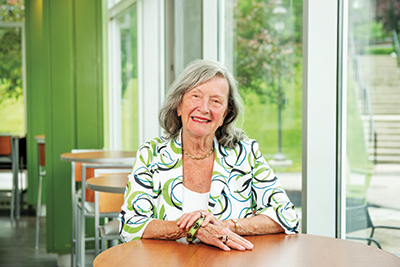
Sandra Adams ’70
Photo: Webb Chappell
Sandra Adams ’70
One of the first two women to earn undergraduate degrees
“I wanted to be an investor, so I transferred from Wellesley College in 1968. Babson had a good program. I was pleased to go there. I was a bit older and already had children. The guys were wonderful. They were as nice as they could be, even if they never saw anything like us before on campus. I had a great time. I wish I could be that age again and do it all over. Babson has a lot of women now. Isn’t that fantastic? I think they would be very happy to step into what Babson offers. It’s all there for them.”
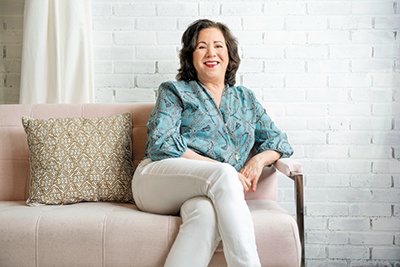
Phyllis Speen ’74
Photo: Webb Chappell
Phyllis Speen ’74
“When I came to Babson I didn’t really think about being one of few women. I wasn’t intimated by that. As women we just did what we wanted to do. A percentage of the guys at Babson came from all-male prep schools, and they weren’t sure how to treat women academically or even socially. They looked at you as a nuisance, usually not as dating material. And then there was a percentage that just were like brothers and would help you. The one thing you’ll hear from many women or men who were the first of something, was that we had the burden of having to succeed no matter what, because we were representative. For three-quarters of my career, I was usually the first or only woman in my role. I never knew not needing to succeed, because I was afraid it would be looked at as women couldn’t do it, versus Phyllis couldn’t do it.”
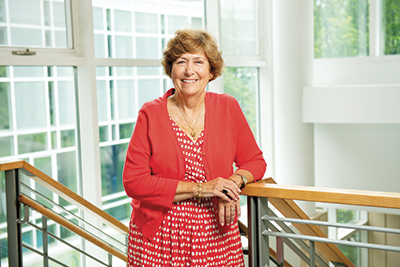
Anne McCormick Heller ’70
Photo: Webb Chappell
Anne McCormick Heller ’70
One of the first two women to earn undergraduate degrees
“There were only two of us in the undergraduate school. And there were no women faculty. There were no women in senior positions. There were no women’s sports. No clubs. I was working hard. It was competitive, but the male students treated me great. They were collegial and easy. I became part of campus life and was on student government. I had great professors. They made me totally comfortable in the classroom.”
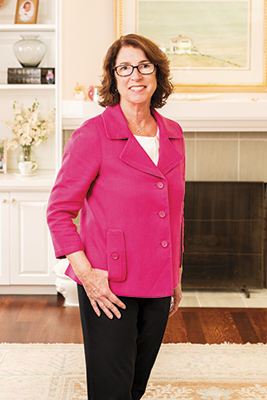
Ellen Monahan Saliba ’74, MBA’80
Photo: Winni Wintermeyer
Ellen Monahan Saliba ’74, MBA’80
“I entered Babson in September 1970. That was the pivotal point. Prior to that, there were a few women. But that September, they admitted about 25. It was not pervasive, but there was an attitude of, what are these women doing here? That kind of stuff went away pretty quickly as they got to know us. We were there to get an education. I don’t think any of the women chose Babson to make a statement.
“We stuck together. To walk into Trim Dining Hall, it was uncomfortable at times. We felt we were very visible, so we would gather at 5:30 in the dorm and walk over together. The women were such a good support structure. We were allowed to put our mark on the school by being leaders on the newspaper, yearbook, student government. I got a great education. I was so well-prepared for life and for working in a world that is male dominated.”
The Pioneers’ Words of Wisdom
Ellen Monahan Saliba:
“Life is long. Keep going. Don’t let a roadblock slow you down from what you want to do.”
Anne McCormick Heller:
“It’s a global world. Take advantage of the international population at the undergrad and grad school. Meet these folks.”
Carolyn Levosky:
“If you’re competent and really know what you’re doing, when you’re speaking to someone, they’re going to listen to you. It doesn’t matter if you’re a man or a woman. If you have credibility, that makes a huge difference.”
Sharon Rowser:
“We’ve made strides, both racially and genderwise, but we still have to pay attention, because discrimination has not gone away.”
Phyllis Speen:
“If you’re in sales, know your audience and talk in terms of their world. Selling is a skill. It’s about listening, asking questions, and understanding someone’s perspective. We should really change the word ‘sales’ to ‘communication’.”
